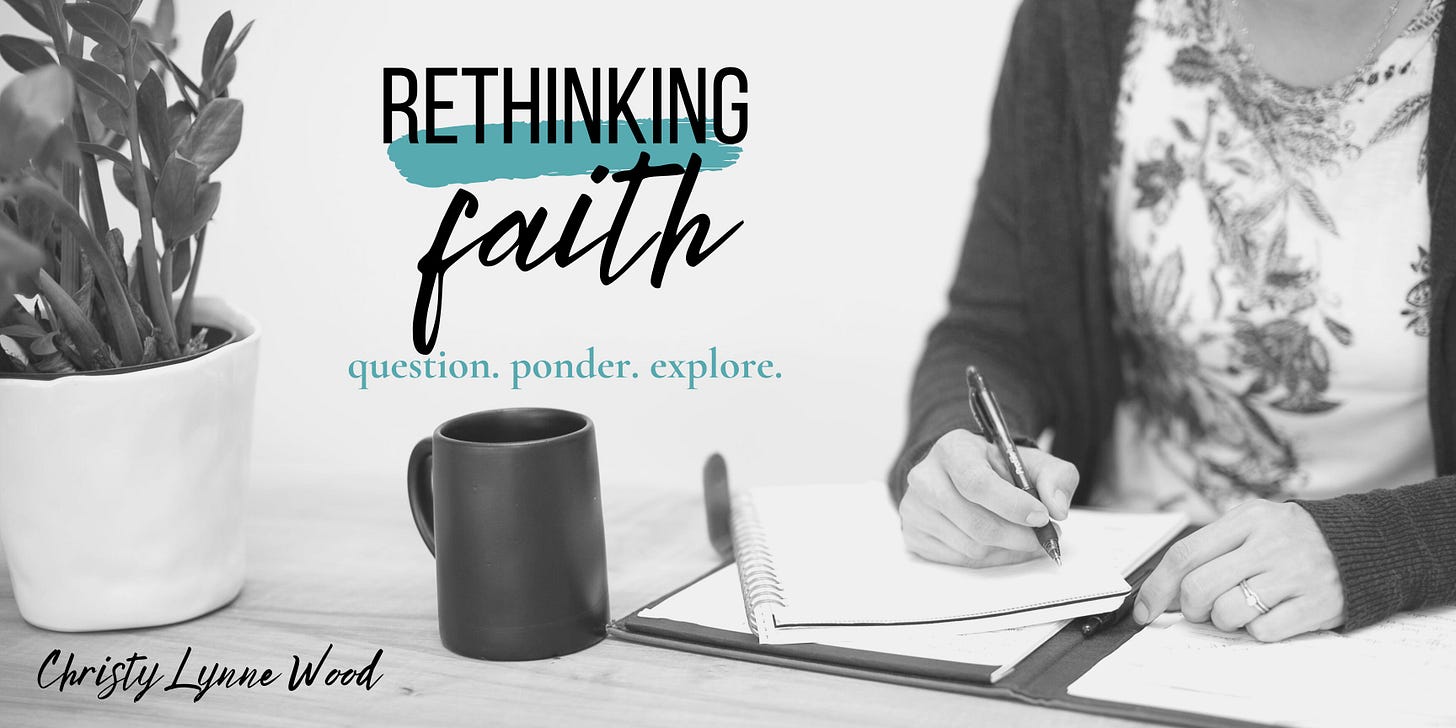Rethinking Faith: A Different Gospel, The Woman They Wanted, and a God Who Goes Away
This month let's explore a Middle Eastern Gospel, ponder yet another memoir, and question why God might go away.
Rethinking Faith: August 2024
Welcome to the August issue of Rethinking Faith. This month we will explore a more Middle Eastern gospel through some Eastern Orthodox beliefs and a shame/honor cultural perspective, ponder the memoir of Shannon Harris (now Hendrickson), and question why God might go away—thanks to my new school role as a behavior specialist.
How is a Middle Eastern Gospel Different Than What We Might Have Experienced?
It is becoming increasingly clear to me that the American evangelical church is struggling and has been struggling for quite some time. As I have questioned and rethought much of my theology and doctrine, I’ve landed in an awkward middle way. If you’ve followed along for any length of time you know this. And if you are new to this space, you will quickly discover that I am usually too edgy and uncomfortable for conservative Christians, but also too orthodox for progressive ones. I’m not looking to join a specific camp. And I love the adventure of searching for truth.

Lately my search is bringing me back to the roots of Christianity. I don’t even know if some people realize this is an option. We can reject the religious garbage and people-made traditions we’ve experienced in our modern Christian Bubble World, and yet we can hold to beliefs about Jesus, God, the Scriptures, and more that have been held by Christians for thousands of years.
As I was talking about my reconstructed view of salvation on one of my social media platforms, someone told me that I sounded a bit Eastern Orthodox. So I did a little digging into Eastern Orthodox belief about salvation and I found these beautiful words on the website of Saint John the Evangelist Orthodox Church in Beaver Falls, Pennsylvania:
“One part of Orthodox theology that differentiates it from the rest of Christendom is its view of salvation. In Eastern Christianity, we see salvation as an ongoing process of purification that reaches beyond this world into eternity. Throughout this process, we participate in the life of the Church. We go to Confession, receive the Eucharist, and strive to love God with our whole heart, strength, soul, and mind. This helps us become more and more like Jesus Christ. Thus, the Orthodox refer to this process of salvation as theosis, or deification.”
This reminded me of my own discussions on how Jesus came to reconnect us to God so that we can be transformed from the inside out. But it gets better.
The article was quick to state that deification does not mean people become gods, but rather that we become more like God through His grace or divine energies. They reinforced the idea that God made humanity in His image (icon), and that we were made to be connected to God, be an icon of God, and share in the Life of the Trinity. However, because of sin our image, or icon, has been warped. This sounds incredibly similar to conclusions that I have come to over the years.
Eastern Orthodox Christians believe that union with Christ allows us to experience communion with God again and that by grace we can become the children of God. They believe that this communion is salvation.
“Through union with Christ, we too can experience that perfect communion. We can become by grace what God is by nature and can become children of God (John 1:12). That is salvation. That is what it means to be saved.
A helpful illustration of deification is the sword and fire example. Imagine a steel sword thrust into a hot fire. It remains there until it takes on a red glow. The energy of the fire interpenetrates the sword, but the sword never becomes the fire itself. Instead, it merely takes on the properties of the fire.
Similarly, the divine energies interpenetrate our human nature through Christ’s glorified flesh.”
The divine energies of God are at work within us, recreating us into the beautiful beings we were made to be. That resonates with me! I also loved that salvation is not seen as a one time action (as we are quick to declare in evangelical land) but is an ongoing process—a process that begins by faith and continues by grace.
As I read more from the church’s website, I found some doctrines that I wasn’t sure about. But that’s okay! It is totally acceptable to search, dig, ponder, wonder, and accept or lay aside as we continue this process of reconstructing our faith. I take comfort in the fact that I am never going to get it exactly right. God is far too amazing and complex. But that’s okay. I’m starting to think it’s more about the journey and less about about finding the “correct” beliefs.

Continuing my pondering of a Middle Eastern understanding of salvation, I wrote this on Threads:
“I wonder what would happen to our understanding of the gospel if we started reading Romans in light of the Middle Eastern shame/honor culture where it was originally written?
What if we recognized we don’t always automatically understand instead of blindly inserting our Western guilt/innocence culture into the picture? Like this:
“For all have sinned and fall short of the glory of God. (Everyone is in a place of shame and we cannot be restored to honor unless someone with honor lifts us up.) But they are justified freely (their honor is restored) by his grace through the redemption that is in Christ Jesus” Romans 3:23-24 (NET).
Jesus came for restoration not just sin management. Sin is more than behaviors. Also, righteousness in Hebrew is closely tied with generosity. With that in mind, look at this:
“God publicly displayed him (Jesus) at his death as the mercy seat accessible through faith. This was to demonstrate his righteousness (generosity) in the present time, so that he would be just (there to restore honor) and the justifier (someone who restores honor) of the one who lives because of Jesus’ faithfulness” Romans 3:26 (NET).
Take time to ponder this. What does it do to your heart?
It makes mine feel loved and free.”
Some people commented that they didn’t see the difference in their old beliefs and what I had just written. Other people felt the difference and were excited about it. Maybe you have to have experienced performance driven, behavior focused, high control religion to feel the freedom. I don’t know. But I feel it, and I want to share it with you. :-)
There have been many times in the past two thousand years that people came along and questioned the accepted religious traditions. They searched for truth in Scripture. They got some things right and brought people back to the cores of the faith. I think this is another season of searching, bringing back, and restoring of the Church. I’m excited to be part of it!
“The Woman They Wanted” by Shannon Harris Hendrickson
Apparently I was on a memoir-of-women-who-have-been-abused-by-the-church kick, because after finishing Rift and Baptistland I picked up The Woman They Wanted by Shannon Harris. The similarities to the previous books were almost chilling.
I’d only known Shannon as the wife of purity culture poster boy, Joshua Harris. I’d read about their love story in Josh’s follow-up book Boy Meets Girl while still in my Christian cult. But as I read Shannon’s version, it was clear that there were two sides to the story. She was a normal young woman who got sucked into an ultra-conservative, cultic church. The church slowly took over and controlled her gifts, dreams, and ultimately her life. After marrying Josh, who ended up coming on staff at the request of the senior pastor, Shannon’s life was even more rigid and scripted. She played a specific role that was given to her for over fifteen years—until the church fell apart. Then questions began and everything started to unravel.
I noticed something. All three women in the books I recently read were controlled by men who got heavily involved in some type of reformed theology. Men who were incredibly certain that their ways and beliefs were correct even though the fruit was obviously rotten. These women were stifled, abused, minimized, and kept silent by a faith system that looked nothing like Jesus. And I wondered if this is a faith system that He would flip over if He came into our churches today.
I’m not saying that all reformed theology is wrong. I think there are pieces that have value. But seeing these patterns does make me suspicious of anyone who is so dogmatic about their beliefs that they won’t listen to others who disagree. It makes me skeptical of people who have a quick answer for every question. And it makes me even more hesitant about churches that believe they are right and everyone else is wrong.
Fruit doesn’t lie. Especially when it seems to be so consistent.
When God Goes Away
I started my new job as an Achievement & Behavior Support Specialist at my school this past week. It sounds fancy, but basically I’m on a team of people who proactively try to prevent and also respond to behavior problems with students. It was a wild and wonderful first week. But as I’ve processed events, I’m seeing a pattern emerge and I’m wondering how it connects to our relationship with God.

Multiple times this week I responded to a student who was having a melt-down. They were dysregulated with a capital D. More than once when I showed up, they yelled at me to “go away!” So I moved away, but I didn’t leave. I made sure that the student was safe and that they knew I was there to help.
Then I waited.
I sat quietly—as close as they let me sit—and I waited for them to calm down. Sometimes I talked to them, but often that just made things worse. Eventually my own regulated nervous system helped to bring their nervous system to a state of better regulation. Then we began to communicate. I validated their feelings. Usually we got to a place of calm and connection. They often came over for a hug, a pat on the shoulder, or a fist bump. We had a real conversation about what happened, the choices they made, and how things could go differently next time. There was restoration and peace.
As I think about our relationship with God, I wonder how many times God moves away because we want Him to—those times we wonder where He is in our lives.
He does what we ask, even though He doesn’t really leave, because He respects our autonomy. I wonder how often He is sitting calmly and quietly helping us to regulate when we don’t even realize it. I think about how I will “ignore” my student and play with something for a while until they begin to reach out. I’m not actually ignoring them; I know exactly what they are doing. But I’m giving them space.
Could God be quietly sitting with us even when He feels so far away? I think so. Could He be gently waiting for the right time to communicate? When we are ready?
If, as a broken human, I can calmly handle a student’s temper tantrum, the God who made and loves us is definitely not fazed by His children’s outbursts. And I know that the minute we are ready for connection, He will be there to love on us, work through things with us, and bring us to a place of peace.
As always, I'd love to hear your thoughts, questions, or comments. You can find me on Threads, Instagram, Facebook, my website, and on my original podcast. I’d love to connect with you on any of these places!
My new podcast, Religious Rebels, can be found on YouTube, Apple Podcasts, Spotify, iHeart Radio, and more. Episodes drop every other Sunday at noon on YouTube and 5pm on Substack and everywhere you listen to podcasts.
You can also order an autographed copy of my book, Religious Rebels: Finding Jesus in the Awkward Middle Way by clicking on the button below. Or you can find it on Amazon.










Oh gosh, this whole piece has just been such a breath of fresh air. YOU are a breath of fresh air. Thank you for sharing your wisdom. I absolutely resonate with the concept of sanctification as a process—not something we can wrap up in a neat and tidy salvation testimony. And what a very good thing!
And the idea that it’s not about having all the right answers—it’s about our communion with Christ, how we draw ever and ever nearer to our Beloved.
That the arc of the gospel is restoration to who we were always meant to be.
There is just so much richness here to ponder. My cup feels a little fuller just having read this ❤️
Christy, it's so great to find you (via KSP's Substack). Goodness, we have much in common--I'm an indie (self-published) author and also a former almost-cult community member from the 70's. I am still in an Evangelical congregation ( my brother was the founding pastor, he's now retired; long story) and in the last few years have become more and more aware of the false beliefs and Christianese like mindset that has permeated their thinking.
I push back when I can and have many of my closest friends outside my denomination/church. Staying close to Jesus is the only way.
P.S. I'm also a retired teacher and spent the last five years of my career in a program with Special Needs kids.... you are offering a miraculous support to the kids you serve.